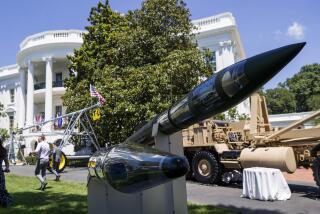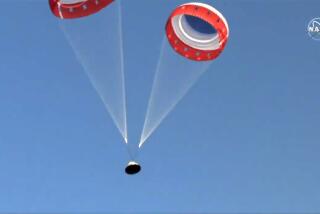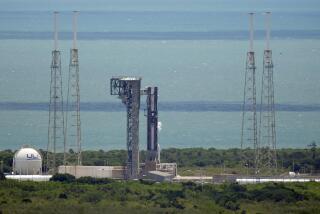Missile Shield Launch May Be Delayed
WASHINGTON — The Pentagon may delay its target date for deploying a national missile shield--possibly by as much as two years--because of mounting technical problems, including delays in development of a new booster rocket, defense officials said Tuesday.
The Pentagon had been hoping that the system would be operational as early as 2005 to protect the 50 states from the threat of a long-range missile attack by “rogue” countries such as North Korea and Iran. The system would employ interceptor rockets, radar and satellite sensors to find and destroy enemy warheads as they streak toward the United States.
But the new booster rocket, which is being developed to lift an antimissile “kill vehicle” into space, now may be a full year behind schedule, officials said. Also complicating the schedule was the failure last month of the system’s fifth flight test, a failure that in turn has raised other technical issues, officials said.
The new complications will require Defense Secretary William S. Cohen to take an additional month, until early September, to issue his long-awaited recommendation to President Clinton on whether to take the first steps to build the controversial antimissile shield.
Whether to postpone the target deployment date “is exactly the type of question the secretary is considering now,” said Kenneth H. Bacon, the Pentagon’s top spokesman. He stressed, however, that the 2005 target date has not been officially changed.
Missile defense advocates, led by congressional Republicans, have been pushing hard to build a missile shield as soon as possible because of what they believe is a growing threat.
If the target deployment date is postponed, “I think you’ll hear some complaints from Capitol Hill that the Clinton administration isn’t as concerned about this as [it] should be,” said an aide to one Republican lawmaker, who asked to remain unidentified. “This is a real threat.”
The antimissile program is highly controversial, however, and others dispute that the United States needs additional deterrent, given its vast superiority in arms.
Under the current schedule, Clinton must order the first steps in construction of the Alaska system before he leaves office if it is to be completed by 2005. A delay in the target deployment date would appear to relieve pressure to make that move.
But Lt. Col. Rick Lehner, a spokesman for the Pentagon’s Ballistic Missile Defense Organization, said officials still may decide that it is advantageous to take those first steps before his successor takes office.
Testing of the new booster rocket was to have started last April with the firing of a rocket from Vandenberg Air Force Base. But because of problems in integrating the new hardware, the test has been delayed until sometime early next year.
The new booster was to have been used for the first time with the missile defense system in the seventh flight test. It now appears that it will not be employed until the eighth, Lehner said.
The delay “is getting longer,” Bacon said. “The question is, has it slipped so much that it changes the schedule of the program? That question has not been answered.”
The July 7 flight test flopped when a component failed to send a signal that would have released the kill vehicle from atop the rocket. Engineers are continuing to study the causes of that failure and to search for a new backup technology to avoid a repeat of the last failure.
Meanwhile, the next flight test, which was to take place in October or November, now may be delayed until December or later, officials said.
Pentagon officials long have warned that the program was operating on a compressed schedule that made delay possible.
“We have always admitted that this was a high-risk program and part of being high risk is the deployment date,” said Bacon. “We will try our best.”
The possibility of delays in developing the rocket booster was suggested in a June report to Cohen by a group of independent advisors who are assigned to review technical progress in the missile defense program. Their report said the Pentagon faces “stressing challenges” to demonstrate in time for a 2005 deployment that the rocket booster--technically called a ground-based interceptor--would perform reliably.
More to Read
Sign up for Essential California
The most important California stories and recommendations in your inbox every morning.
You may occasionally receive promotional content from the Los Angeles Times.











